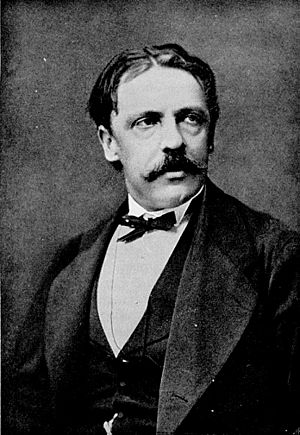Viktor Rydberg facts for kids
Quick facts for kids
Viktor Rydberg
|
|
|---|---|

Rydberg in 1876
|
|
| Born | Abraham Viktor Rydberg 18 December 1828 Jönköping, United Kingdoms of Sweden and Norway |
| Died | 21 September 1895 (aged 66) Djursholm, Stockholm county, United Kingdoms of Sweden and Norway |
| Occupation | Author, journalist, novelist, translator and poet |
| Nationality | Swedish |
| Period | Victorian, Oscarian |
| Genre | Romance |
| Subject | Mythology, Religion |
| Notable works | Singoalla, Undersökningar i Germanisk Mythologi I-II, Fädernas Gudasaga |
| Spouse | Susen Hasselblad |
| Relatives | Johann Rydberg (father), Hedvig Düker (mother) |
Abraham Viktor Rydberg (born December 18, 1828 – died September 21, 1895) was a famous Swedish writer. He was a member of the Swedish Academy from 1877 to 1895. People often called him "Sweden's last Romantic" writer. By 1859, he was seen as one of the best novelists in Sweden.
Contents
Viktor Rydberg's Early Life
Viktor Rydberg came from a family that was not wealthy. He worked very hard to get an education. Learning was a huge passion for him throughout his life. He became skilled in many different areas of study.
His father, Johan Rydberg, was a soldier who later became a prison guard. His mother, Hedvig Düker, was a midwife. Viktor had two brothers and three sisters. In 1834, his mother passed away during a cholera outbreak. This sad event deeply affected his father. His father became very ill and lost his job. The family also lost their home. Young Viktor had to live in different foster homes. One of these homes even burned down, which was very upsetting for him.
Education and Career Beginnings
Even though he faced financial difficulties, people recognized Viktor Rydberg's talent. From 1838 to 1847, he went to grammar school. He then studied law at the university in Lund from 1851 to 1852. He had to stop his university studies after only one year because he ran out of money. He did not get a degree.
After leaving university, he worked as a private tutor, teaching students. In 1855, he got a job at a newspaper in Gothenburg called Göteborgs Handels- och Sjöfartstidning. He worked there for over 20 years. During this time, his first novels were published. He quickly became a very important writer in Sweden. He was known as Sweden's most famous living author.
Political Involvement and Social Views
Throughout his adult life, Viktor Rydberg was active in politics. In 1859, he wrote about national defense. This writing helped start the "Sharpshooter's movement." This was a group of volunteers who were important in politics during the 1860s. In 1870, he supported Germany during the Franco-Prussian War. This was a debated topic at the time.
From 1870 to 1872, Rydberg was a member of the Swedish Parliament. He supported the traditional economic system of Sweden. He also strongly supported Jewish people. As a Member of Parliament, Viktor Rydberg gave an important speech. This speech helped pass a law giving all non-Lutherans full civil rights. He worked hard to improve conditions for working-class people. His writings on labor issues were very important to this group.
He also wanted to change the Swedish language. He believed in removing foreign words, especially German ones. Around this time, he started spelling his own name Viktor instead of Victor. This was to make it sound more Germanic.
Literary Contributions and Later Life
Viktor Rydberg created several new Swedish words during his career. Many of these words are still used today. For example, he used gudasaga instead of the foreign word mythologi for mythology.
In 1884, he did not support the writer August Strindberg in a legal case. Later, in 1888, Rydberg was on a jury for the trial of socialist leader Hjalmar Branting. Rydberg voted to send Branting to jail. After this, they never spoke to each other again.
Rydberg was worried about how factories were run during the start of the industrial age. He wrote a famous poem called Den nya Grottesången (The New Grotti Song). In this poem, he strongly criticized the terrible working conditions in factories. He used the old story of the mill of Grottasöngr as his background.
For his many literary achievements, Rydberg received an honorary doctorate from the University of Uppsala in 1877. He was also elected a member of the Swedish Academy in the same year. From 1883, he taught at Stockholms högskola, which is now Stockholm University. He became a professor there in 1884. In 1889, he became the first person to hold the J. A. Berg Chair of the History and Theory of Art. He was also elected a member of the Royal Swedish Academy of Sciences in 1889.
Death and Legacy
Viktor Rydberg passed away at age 66 on September 21, 1895. He died due to health problems from diabetes and arteriosclerosis. News of his death reached as far as the United States. The New York Times published an obituary about him. It was titled: "Death of Prof. A.V. Rydberg, Career and Remarkable works of one of Sweden's Leading Men."
A national day of mourning was held all over Sweden. Today, his grave is a national monument. Many of his works have been translated into other languages. They are still printed and read today. His writings are widely read in schools throughout Sweden. His poem "Tomten" ("Santa" or "The Gnome") is a favorite Christmas poem. He also wrote the lyrics for the song Gläns över sjö och strand.
Several places are named after him. These include three high schools and one middle school in Stockholm. There is also a street in Gothenburg and a student dormitory. He is still listed in many encyclopedias in English.
See also
 In Spanish: Viktor Rydberg para niños
In Spanish: Viktor Rydberg para niños

